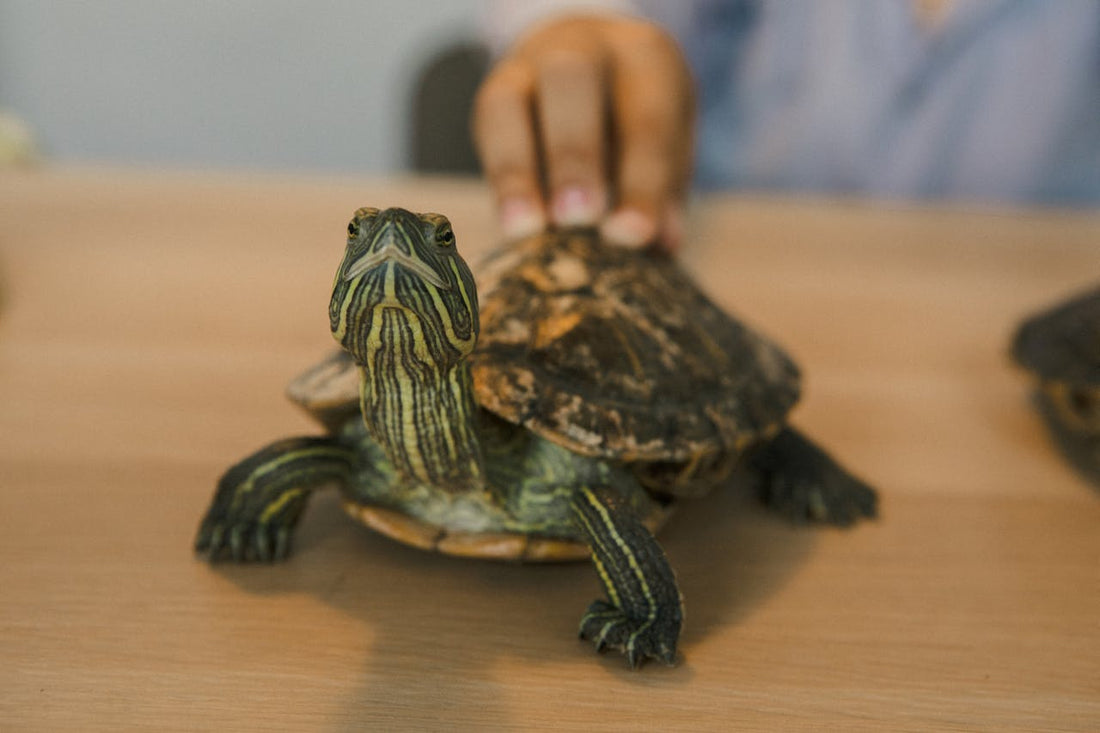A Guide to Tortoise Care

When it comes to caring for a tortoise, providing the right environment, balanced nutrition, and consistent health checks are essential. Whether you’re a first-time tortoise owner or looking to improve your setup, here’s everything you need to know to help your shelled friend thrive!
1. Setting Up the Ideal Habitat
Creating the right habitat for your tortoise is essential for their comfort, health, and overall well-being. Here are some key considerations:
- Enclosure Size: Tortoises need ample space to move around. For small tortoises, a 3x3-foot enclosure may suffice, but larger species can require enclosures of 8x8 feet or more.
- Indoor vs. Outdoor: Many tortoises do well in outdoor enclosures where they can bask in natural sunlight, which provides essential UVB rays. Indoor setups should include UVB lighting to mimic sunlight and encourage healthy shell and bone development.
- Temperature & Lighting: Tortoises are ectothermic, so they rely on external heat to regulate their body temperature. Provide a basking area of 85-95°F and a cooler area of around 70°F. Use a ceramic heat emitter or a basking bulb for warmth, and a UVB light for 10-12 hours each day.
- Substrate: Avoid substrates that retain too much moisture, like wood chips or pine shavings, as they can lead to respiratory issues. Opt for organic topsoil or a soil-sand mix, which allows for burrowing and is safer for tortoises.
- Shelter: Provide a shaded or covered shelter area within the enclosure for your tortoise to retreat and feel secure.
2. Nutrition: What to Feed Your Tortoise
Feeding your tortoise a balanced diet is key to keeping them healthy and active. Since most tortoises are herbivores, their diet should consist primarily of plants and vegetables.
- Leafy Greens: Aim for a variety of leafy greens, like collard greens, dandelion greens, kale, and mustard greens. These are nutrient-rich and provide fiber.
- Vegetables: Offer a mix of veggies like bell peppers, carrots, and squash a few times a week. Avoid starchy vegetables like potatoes, as they are harder for tortoises to digest.
- Occasional Fruits: Some tortoises enjoy small amounts of fruit as a treat, like berries or melon. However, fruit should be limited, as too much sugar can lead to digestive issues.
- Calcium Supplementation: Tortoises require calcium for strong bones and shell health. Dust their food with a calcium supplement once or twice a week, especially if they’re indoors and not receiving direct sunlight.
- Water: Provide a shallow dish of fresh water daily. Tortoises also benefit from soaking sessions once or twice a week, where they can hydrate and clean their shells.
3. Keeping Your Tortoise Healthy
Tortoises are generally hardy animals, but they are prone to certain health issues. Here’s how to stay proactive about their health:
- Routine Checks: Regularly inspect your tortoise for signs of illness, including changes in appetite, unusual shell texture, or discharge from the nose or mouth. Also, check their limbs for any signs of injury.
- Respiratory Health: Tortoises can develop respiratory infections, especially if their enclosure is too damp or cool. Signs of respiratory issues include wheezing, labored breathing, and mucus. Ensure your tortoise’s habitat is dry and warm, and consult a vet if respiratory symptoms appear.
- Shell Health: Shell rot is a common issue caused by damp or unsanitary conditions. Prevent shell rot by keeping the enclosure clean and ensuring adequate ventilation. If you notice soft spots or a foul smell, consult a vet.
- Parasite Prevention: Tortoises, like other reptiles, can be susceptible to parasites. Keep their enclosure clean and bring your tortoise for a routine vet check-up at least once a year to detect any issues early on.
- Beak and Claw Maintenance: Tortoise beaks and claws grow continuously. Provide natural rocks or cuttlebones in the enclosure to allow them to file their beaks and claws naturally. If they become overgrown, your vet can safely trim them.
4. Creating a Bond with Your Tortoise
Building a connection with your tortoise can enhance the experience of pet ownership. While they may not be as interactive as some pets, tortoises can recognize their owners over time and even respond to your presence.
- Gentle Interaction: Tortoises appreciate a calm environment and slow, gentle movements. Avoid startling them and always approach them from the front.
- Hand Feeding: Offering small treats like leafy greens by hand can help them associate you with positive experiences. However, be patient, as it may take time for them to feel comfortable.
- Respecting Their Space: Tortoises are solitary animals and enjoy their own space. Give them plenty of time in their habitat to explore, dig, and bask.
By providing a well-thought-out habitat, a balanced diet, and regular health checks, you’ll help ensure your tortoise lives a long, happy, and healthy life.
